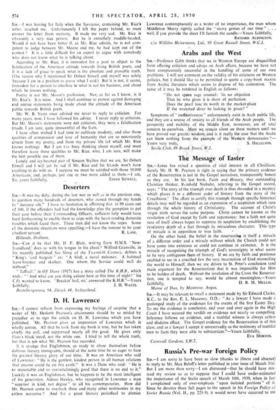D. H. Lawrence
SIR,—I cannot refrain from expressing my feelings of surprise that a writer of Mr. Hesketh Pearson's attainments should be so misled by prejudice as to sign the article on D. H. Lawrence which you have published. Mr. Pearson gives an impression of Lawrence which is wholly untrue. All that he took from my book is. true, but he has taken chiefly the evil, and suppressed nearly all the good. He gives only Plato's black-steed, not the white one. I tried to tell the whole truth, but that is not what Mr. Pearson has recorded.
It is strange that Englishmen, so ready to abase themselves before dubious literary immigrants, should at the same time be so eager to hate the greatest literary glory of our time. It was an American who said of Lawrence: "He is the gentlest, kindest person in all human relations that anyone could be on this earth." It was a Dane who said: " He is so reasonable and so overwhelmingly good that there is no end to it." Luckily it was an Englishman, but he happens to be the most intelligent of his generation, Aldous Huxley, who recognised in Lawrence a man " superior in kind, not degree " to all his contemporaries. How did Mr. Pearson come to overlook these and many other testimonies in my artless narrative ? And for a great literary periodical to dismiss Lawrence contemptuously as a writer of no importance, the man whom Middleton Murry rightly called the "starry genius of our time" . . . well, if you provide the sheet l'll furnish the candle.—Yours faithfully,
RICHARD ALDINGTON.
C/O William Heinemann, Ltd., 99 Great Russell Street, W.C.I.










































 Previous page
Previous page